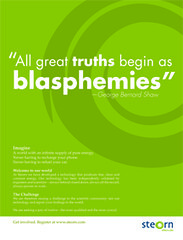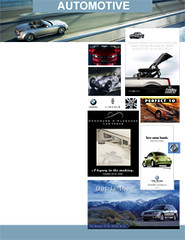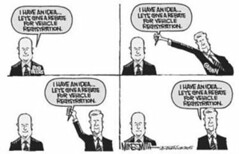Sometimes watching what our peers are producing in the advertising industry is akin to witnessing brand-assisted suicide. And it happens all too much.
This week, we witnessed two more message massacres: Ikea could have used Photoshop to pull up the covers and CBS used Photoshop a bit too much on Katie Couric. For all their years of building brand, it only took a few minutes for Ikea to move from 'cool furniture' to 'pet sexploitation' and CBS from having a 'fan-friendly' Katie Couric to a 'Celebrity Fit Club candidate.'
I cannot even begin to comment on Kyra Phillips' credibility crusher here. Frankly, it deserves its own post, not because she made a mistake when she forgot to turn her mic off, but because her candid sister-in-law commentary wasn't even fit for toilet talk.
It's a shame. And it happens all too much. Augusten Burroughs, former ad copywriter turned self-degregating but entertaining confessional author, paints a pretty good picture of how it happens in his book Possible Side Effects.
Burroughs shares a story about how he and a colleague came up with a not so strategic but what would have been a reasonably effective ad campaign for Junior Mints. Their idea was to create a montage spot with people reaching for Junior Mints when you least expect it — while driving in a convertible, riding on a roller coaster, even watching a good movie — and then superimposing a play on words 'Refresh ... mint,' Excite ... mint,' 'Entertain ... mint,' etc.
While the idea is hardly industry earth-shattering, it is cute enough to grab attention and smart enough to solve several of the major problems the client claimed to have: Junior Mints are likened to being a boring movie candy.
It takes less than a single client review meeting to melt the idea. Burroughs humorously conveys what happened at the meeting and how the client strips the concept down to showing a bunch of people standing in a supermarket munching mints right there in the aisle. As funny as it reads in the book, I also found it tragic. It's tragic because the entire chapter is nothing less than being unable to avert your eyes at the scene of an auto accident.
One of the very few rules to consider in advertising is that "nobody is as interested in a product as the company who makes it." Endless product shots and people popping mints is boring. On the opposite end of the spectrum, a guy watching a poll-dancing Burger "King" is, frankly, the quickest way to kill any appetite.
So there you have it. Ikea could have pulled up the blanket (or at least picked a different shot). Couric could have used a new photo shoot (though the color correction would have been okay). Junior Mints needed to add some excitement to its spots. The Burger King creative people are allowed to run amok too much.
At the end of the day, what they all seem to be missing is one simple truth: the answer to most advertising dilemmas lands somewhere in the middle: creative ideas that change people's behavior, giving them a real reason to buy one product over another. Crazy.
This week, we witnessed two more message massacres: Ikea could have used Photoshop to pull up the covers and CBS used Photoshop a bit too much on Katie Couric. For all their years of building brand, it only took a few minutes for Ikea to move from 'cool furniture' to 'pet sexploitation' and CBS from having a 'fan-friendly' Katie Couric to a 'Celebrity Fit Club candidate.'
I cannot even begin to comment on Kyra Phillips' credibility crusher here. Frankly, it deserves its own post, not because she made a mistake when she forgot to turn her mic off, but because her candid sister-in-law commentary wasn't even fit for toilet talk.
It's a shame. And it happens all too much. Augusten Burroughs, former ad copywriter turned self-degregating but entertaining confessional author, paints a pretty good picture of how it happens in his book Possible Side Effects.
Burroughs shares a story about how he and a colleague came up with a not so strategic but what would have been a reasonably effective ad campaign for Junior Mints. Their idea was to create a montage spot with people reaching for Junior Mints when you least expect it — while driving in a convertible, riding on a roller coaster, even watching a good movie — and then superimposing a play on words 'Refresh ... mint,' Excite ... mint,' 'Entertain ... mint,' etc.
While the idea is hardly industry earth-shattering, it is cute enough to grab attention and smart enough to solve several of the major problems the client claimed to have: Junior Mints are likened to being a boring movie candy.
It takes less than a single client review meeting to melt the idea. Burroughs humorously conveys what happened at the meeting and how the client strips the concept down to showing a bunch of people standing in a supermarket munching mints right there in the aisle. As funny as it reads in the book, I also found it tragic. It's tragic because the entire chapter is nothing less than being unable to avert your eyes at the scene of an auto accident.
One of the very few rules to consider in advertising is that "nobody is as interested in a product as the company who makes it." Endless product shots and people popping mints is boring. On the opposite end of the spectrum, a guy watching a poll-dancing Burger "King" is, frankly, the quickest way to kill any appetite.
So there you have it. Ikea could have pulled up the blanket (or at least picked a different shot). Couric could have used a new photo shoot (though the color correction would have been okay). Junior Mints needed to add some excitement to its spots. The Burger King creative people are allowed to run amok too much.
At the end of the day, what they all seem to be missing is one simple truth: the answer to most advertising dilemmas lands somewhere in the middle: creative ideas that change people's behavior, giving them a real reason to buy one product over another. Crazy.























